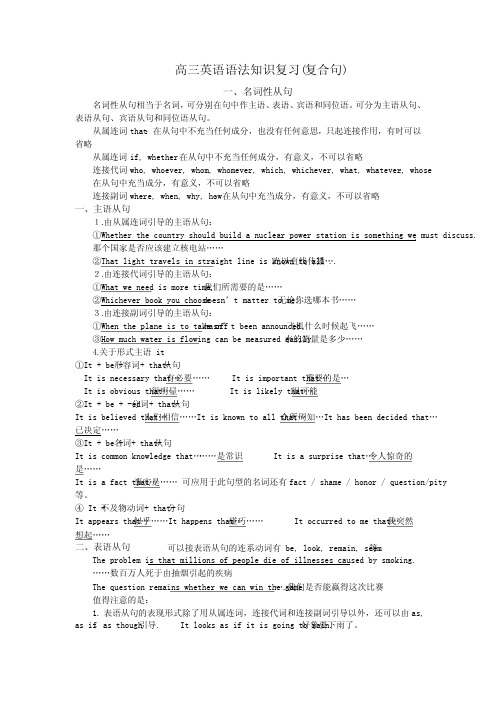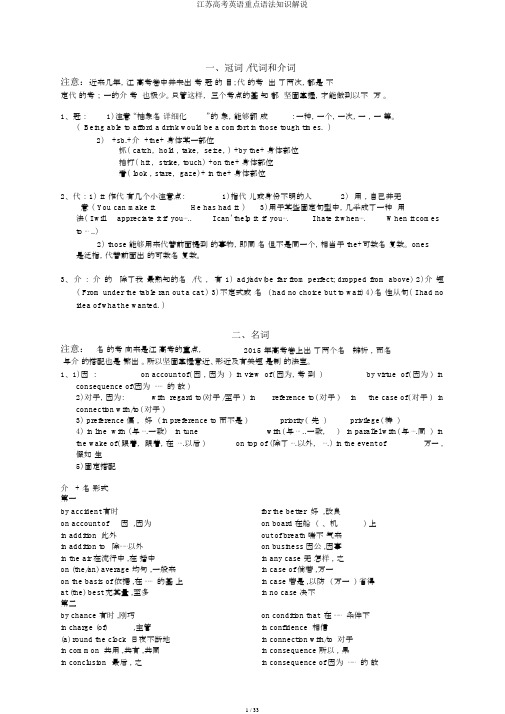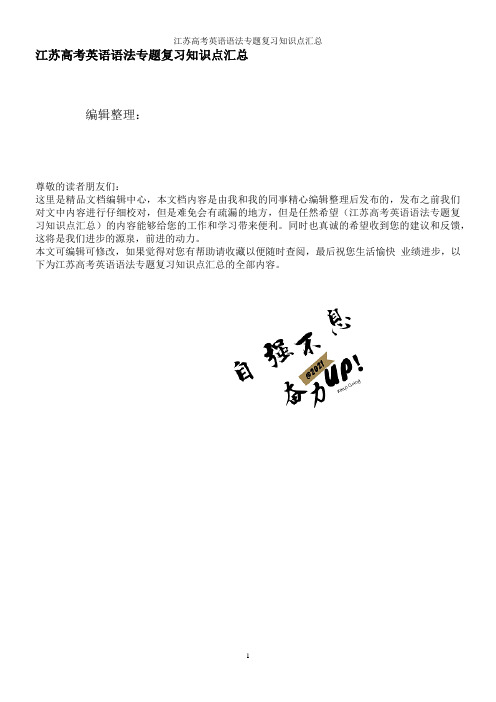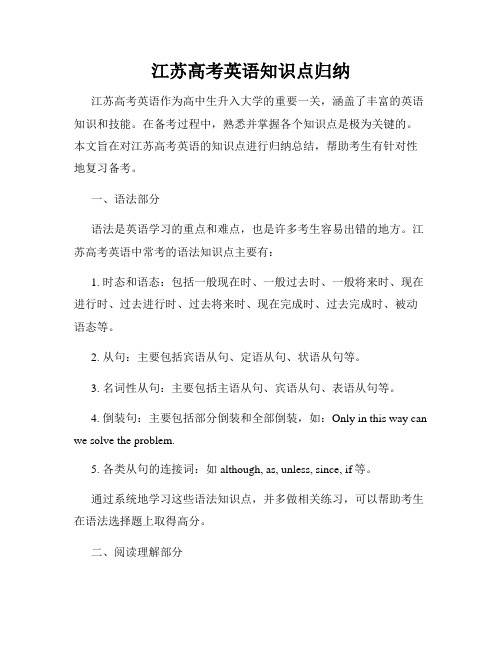(完整版)江苏高考英语语法专题复习知识点汇总,推荐文档
江苏高考英语语法专题复习知识点汇总

江苏高考英语语法专题复习知识点汇总一、冠词The Article知识要点:冠词是一种虚词,放在名词的前面,帮助说明名词的含义。
冠词分不定冠词(The Indefinite Article)和定冠词(The definite Article)两种。
a (an) 是不定冠词,a用在辅音之前:如a book, a man; an用在元音之前,如:an old man, an hour, an interesting book等。
the是定冠词。
一、不定冠词的用法1、指人或事物的某一种类(泛指)。
这是不定冠词a (an)的基本用法。
如:She is a girl. I am a teacher. Please pass me an apple.2、指某人或某物,但不具体说明何人或何物。
如:He borrowed a story-book from the library.A Li is looking for you. 一位姓李的同志正在找你。
3、表示数量,有“一”的意思,但数的概念没有one强烈。
如:I have a mouth, a nose and two eyes.4、用于某些固定词组中。
如:a bit, a few, a little, a lot of, a piece of, a cup of, a glass of, a pile of, a pair of, have a good time, for a while, for a long time等。
5、用在抽象名词前,表具体的介绍——a + 抽象名词,起具体化的作用。
如:This little girl is a joy to her parents. 这女孩对她父母来说是一个乐趣。
It is a pleasure to talk with you. 跟您交谈真是一件愉快的事情。
It is an honour to me to attend the meeting. 参加这个会,对我来说是一种荣誉。
江苏高考高三英语语法知识复习

高三英语语法知识复习(复合句)一、名词性从句名词性从句相当于名词,可分别在句中作主语、表语、宾语和同位语。
可分为主语从句、表语从句、宾语从句和同位语从句。
从属连词that:在从句中不充当任何成分,也没有任何意思,只起连接作用,有时可以省略从属连词if, whether:在从句中不充当任何成分,有意义,不可以省略: 连接代词who, whoever, whom, whomever, which, whichever, what, whatever, whose在从句中充当成分,有意义,不可以省略连接副词where, when, why, how:在从句中充当成分,有意义,不可以省略一、主语从句1.由从属连词引导的主语从句:①Whether the country should build a nuclear power station is something we must discuss.那个国家是否应该建立核电站……光以直线传播….②That light travels in straight line is known to all .2.由连接代词引导的主语从句:我们所需要的是……①What we need is more time.无论你选哪本书……②Whichever book you choosedoesn’t matter to me.3.由连接副词引导的主语从句:飞机什么时候起飞……①When the plane is to take offhasn’t been announced.水的流量是多少……③How much water is flowing can be measured easily.4.关于形式主语 it①It + be +形容词+ that-从句重要的是…有必要…… It is important that…It is necessary that…很明显…… It is likely that….很可能It is obvious that…分词+ that-从句②It + be + -ed众所周知…It has been decided that…人们相信……It is known to all that…It is believed that…已决定……名词+ that-从句③It + be +It is common knowledge that… ……是常识 It is a surprise that…令人惊奇的是……事实是…… 可应用于此句型的名词还有fact / shame / honor / question/pityIt is a fact that…等。
(2020年7月整理)江苏高考英语语法专题复习知识点汇总.doc

江苏高考英语语法专题复习知识点汇总一、冠词The Article知识要点:冠词是一种虚词,放在名词的前面,帮助说明名词的含义。
冠词分不定冠词(The Indefinite Article)和定冠词(The definite Article)两种。
a (an) 是不定冠词,a用在辅音之前:如a book, a man; an用在元音之前,如:an old man, an hour, an interesting book等。
the是定冠词。
一、不定冠词的用法1、指人或事物的某一种类(泛指)。
这是不定冠词a (an)的基本用法。
如:She is a girl. I am a teacher. Please pass me an apple.2、指某人或某物,但不具体说明何人或何物。
如:He borrowed a story-book from the library.A Li is looking for you. 一位姓李的同志正在找你。
3、表示数量,有“一”的意思,但数的概念没有one强烈。
如:I have a mouth, a nose and two eyes.4、用于某些固定词组中。
如:a bit, a few, a little, a lot of, a piece of, a cup of, a glass of, a pile of, a pair of, have a good time, for a while, for a long time等。
5、用在抽象名词前,表具体的介绍——a + 抽象名词,起具体化的作用。
如:This little girl is a joy to her parents. 这女孩对她父母来说是一个乐趣。
It is a pleasure to talk with you. 跟您交谈真是一件愉快的事情。
It is an honour to me to attend the meeting. 参加这个会,对我来说是一种荣誉。
江苏高考英语语法专题复习知识点汇总

二lon、g T51aII定titt、、mhbii冠issies用特taa,词l等niap在指tthl的。fleeeo抽某awn用gso象(,uirur法aler名些ils:titoto词)taltmeja前人,olekya或,towtloo某表iatththote具(efryn,op体些dauatp.r的)heie跟en介事ctmse您.绍物eoe这交ft。—,in女谈ag这—c.孩真u是a参p对是+定o加她f一抽,冠这a父件象词g个母愉l名a会tsh来快词se,o说的的,f对,是事基起a我一p情本具i来l个。e用体说o乐法化f是,趣。的a一p。如作a种i:r用荣o。f,誉h如。av:e a good time, for a while, for a
T4、he用ba在by世w界as上th独in.一无二的事物前。如:
t5h、e e用ar在th,序th数e m词o和on形, t容he词su最n.高级前。(副词最高级前的定冠词可省略)如:
He is always the first to come to school.
Bob is the tallest in his class.
a sheep, two sheep
)只用复数形式: … d
thanks, trousers, goods, clothes, socks, shoes,
)形复实单: (塑料), e
physics, politics, maths, news, plastics
means.
)形单实复: 人民,人们), 等 f
等。 the way 、用在江河湖海、山脉前。如: 8
the Yellow River, the Pacific Ocean, the Alps, the Himalayas
高三英语知识点总结归纳江苏版

高三英语知识点总结归纳江苏版英语是高中教育的重要学科之一,对于高三学生来说,掌握英语知识点是备战高考的关键。
下面将对江苏版高三英语教材中的重要知识点进行总结归纳,以帮助学生更好地复习和备考。
一、语法知识点1. 时态英语中的时态主要包括一般现在时、一般过去时、一般将来时等。
要注意时态的正确使用,以及与其他时态的区别。
2. 从句从句分为名词性从句、定语从句和状语从句等。
要理解从句的用法,并掌握从句的引导词以及在句中的位置。
3. 形容词和副词形容词和副词用于修饰名词和动词。
要学会形容词和副词的规则变化,以及用于比较级和最高级的形式。
4. 主谓一致主谓一致主要指的是主语的单复数和谓语动词的单复数形式需要一致。
要注意判断主语的单复数形式,并用相应的谓语动词。
5. 连词连词用于连接句子、词组或者句子中的词语。
要学会使用并列连词、递进连词、转折连词和条件连词等。
二、词汇知识点1. 同义词和反义词同义词指的是意义相同或相近的词语,而反义词指的是意义相反的词语。
要学会运用同义词和反义词,丰富词汇量。
2. 常见词汇要掌握高考常见的词汇,包括名词、动词、形容词和副词等。
要学会运用这些词汇进行句子的构建和表达。
3. 词组和短语词组和短语是由两个或多个词语组成的固定搭配,具有特定的意义。
要学习掌握常见的词组和短语,提高表达的准确性。
三、阅读理解阅读理解是高考英语中的重要题型,要能够快速准确地理解文章,并回答相关问题。
要注意理解文章的主旨、细节和推理等要点。
四、写作技巧写作是英语考试中的一项重要技能,要善于运用所学的词汇和语法知识进行写作。
要注意篇章结构的合理安排,句子的连贯性和语言的表达准确性。
以上就是对江苏版高三英语教材的知识点进行的总结归纳。
希望同学们能够认真复习和巩固这些知识点,提高英语水平,取得好成绩。
祝愿大家在高考中取得优异的成绩!。
江苏高考英语重点语法知识讲解

一、冠词 /代词和介词注意:近来几年,江高考卷中并未出考冠的目;代的考出了两次,都是不定代的考;一的介考也极少。
只管这样,三个考点的基知都坚固掌握,才能做到以不万。
1、冠:1)注意“抽象名详细化”的象,能够翻成: 一种,一个,一次,一,一等。
(Being able to afford a drink would be a comfort in those tough times. )2) +sb.+介 +the+ 身体某一部位抓( catch, hold ,take, seize,) +by the+ 身体部位拍打( hit , strike,touch) +on the+ 身体部位看( look ,stare, gaze)+ in the+ 身体部位2、代: 1) it 作代有几个小注意点:1)指代儿或身份不明的人2)用,自己并无意( You can make it. He has had it. )3)用于某些固定句型中,几乎成了一种用法( I will appreciate it if you⋯..I can’thelp it if you⋯.I hate it when⋯.When it comes to ⋯ ..)2) those能够用来代替前面提到的事物,即同名但不是同一个,相当于 the+可数名复数。
ones 是泛指,代替前面出的可数名复数。
3、介:介的除了我最熟知的名/代,有 1) adj/adv(be far from perfect; dropped from above) 2)介短( From under the table ran out a cat.) 3)不定式或名 ( had no choice but to wait) 4)名性从句( I had no idea of what he wanted. )二、名词注意:名的考向来是江高考的重点,2015 年高考卷上出了两个名辨析,而名与介的搭配也是繁出。
江苏高考语法知识点汇总

江苏高考语法知识点汇总江苏高考对语法的要求较为严格,考查的知识点也相对较多。
下面将对江苏高考中常见的语法知识点进行汇总,帮助同学们复习备考。
一、主谓一致1. 单数主语与单数谓语动词相搭配,复数主语与复数谓语动词相搭配。
- The book is on the table.(单数主语)- The books are on the table.(复数主语)2. 谓语动词的用法:a. 一般现在时:主语为第三人称单数,动词加s或es。
- She teaches English at school.b. 现在进行时:主语+am/is/are+现在分词。
- They are playing basketball.3. 单数主语连同 each, every, either, neither 或者表示时间、距离和金额的词搭配时,谓语动词用单数形式。
- Each of us is responsible for our own choices.- Neither of the boys has finished their homework.二、代词1. 人称代词的正确使用:- 主格:I, you, he, she, it, we, they- 宾格:me, you, him, her, it, us, them- 形容词性物主代词:my, your, his, her, its, our, their- 名词性物主代词:mine, yours, his, hers, its, ours, theirs2. 指示代词的用法:- This 近指,指离说话人或看到的人或物;- That 远指,指离说话人和听话人都不近的人或物;- These 复数近指,指离说话人或看到的人或物;- Those 复数远指,指离说话人和听话人都不近的人或物。
3. 不定代词的正确使用:- everyone, nobody, somebody, anybody, nobody等作主语时,谓语动词用单数。
江苏高考英语语法专题复习知识点汇总

江苏高考英语语法专题复习知识点汇总一、冠词The Article知识要点:冠词是一种虚词,放在名词的前面,帮助说明名词的含义。
冠词分不定冠词(The Indefinite Article)和定冠词(The definite Article)两种。
a (an) 是不定冠词,a用在辅音之前:如a book, a man; an用在元音之前,如:an old man, an hour, an interesting book等。
the是定冠词。
一、不定冠词的用法1、指人或事物的某一种类(泛指)。
这是不定冠词a (an)的基本用法。
如:She is a girl. I am a teacher. Please pass me an apple.2、指某人或某物,但不具体说明何人或何物。
如:He borrowed a story-book from the library.A Li is looking for you. 一位姓李的同志正在找你。
3、表示数量,有“一”的意思,但数的概念没有one强烈。
如:I have a mouth, a nose and two eyes.4、用于某些固定词组中。
如:a bit, a few, a little, a lot of, a piece of, a cup of, a glass of, a pile of, a pair of, have a good time, for a while, for a long time等。
5、用在抽象名词前,表具体的介绍——a + 抽象名词,起具体化的作用。
如:This little girl is a joy to her parents. 这女孩对她父母来说是一个乐趣。
It is a pleasure to talk with you. 跟您交谈真是一件愉快的事情。
It is an honour to me to attend the meeting. 参加这个会,对我来说是一种荣誉。
(完整版)江苏高考英语语法专题复习知识点汇总,推荐文档

如:half an hour’s walk (半小时的路程) China’s agriculture (中国的农业)
1、指人或事物的某一种类(泛指)。这是不定冠词 a (an)的基本用法。如:She is a girl. I am a teacher. Please pass me an apple.
2、指某人或某物,但不具体说明何人或何物。如:He borrowed a story-book from the library. A Li is looking for you. 一位姓李的同志正在找你。
b)不规则变化——child (children), foot (feet), tooth (teeth), man (men),
woman (women), mouse (mice), goose (geese), Englishman (Englishmen),
phenomenon(phenomena)…
3、表示数量,有“一”的意思,但数的概念没有 one 强烈。如: I have a mouth, a nose and two eyes.
4、用于某些固定词组中。如: a bit, a few, a little, a lot of, a piece of, a cup of, a glass of, a pile of, a pair of, have a good time, for a while, for a long time 等。 5、用在抽象名词前,表具体的介绍——a + 抽象名词,起具体化的作用。如: This little girl is a joy to her parents. 这女孩对她父母来说是一个乐趣。 It is a pleasure to talk with you. 跟您交谈真是一件愉快的事情。 It is an honour to me to attend the meeting. 参加这个会,对我来说是一种荣誉。 二、定冠词的用法: 1、特指某(些)人或某(些)事物。这是定冠词 the 的基本用法。如: Beijing is the capital of China. The pen on the desk is mine. 2、指谈话双方都知道的人或事物。如: Where is the teacher? Open the window, please. 3、指上文提过的人或事物(第二次出现)。如: There was a chair by the window. On the chair sat a young woman with a baby in her arms. The baby was thin. 4、用在世界上独一无二的事物前。如: the earth, the moon, the sun. 5、用在序数词和形容词最高级前。(副词最高级前的定冠词可省略)如: He is always the first to come to school. Bob is the tallest in his class. 6、用在某些专有名词前(由普通名词构成的专用名词)。如: the Great Wall, the Summer Palace, the Science Museum, the Children’s Palace, the Party 等。 7、用在一些习惯用语中。如: on the day, in the morning (afternoon, evening), the day after tomorrow, the day before yesterday, the next year, by the way 等。 8、用在江河湖海、山脉前。如: the Yellow River, the Pacific Ocean, the Alps, the Himalayas 9、用在报刊、杂志前。如: the People’s Daily, the Evening Paper, the Times 泰晤士报。 10、表示某一家人要加定冠词。如: The Browns are at home to receive visitors today. 布朗一家今天要接待客人。 11、用在形容词前,表某一类人。如: the poor, the wounded, the living, the dead, the rich, the sick 等。 12、定冠词可以表示一事物内部的某处。如: The driver always sits in the front of the bus(car). 三、零冠词(即不用冠词): 1、专用名词和不可数名词前。如:
江苏高考英语语法专题复习知识点汇总(2)(K12教育文档)

江苏高考英语语法专题复习知识点汇总(2)(word版可编辑修改)编辑整理:尊敬的读者朋友们:这里是精品文档编辑中心,本文档内容是由我和我的同事精心编辑整理后发布的,发布之前我们对文中内容进行仔细校对,但是难免会有疏漏的地方,但是任然希望(江苏高考英语语法专题复习知识点汇总(2)(word版可编辑修改))的内容能够给您的工作和学习带来便利。
同时也真诚的希望收到您的建议和反馈,这将是我们进步的源泉,前进的动力。
本文可编辑可修改,如果觉得对您有帮助请收藏以便随时查阅,最后祝您生活愉快业绩进步,以下为江苏高考英语语法专题复习知识点汇总(2)(word版可编辑修改)的全部内容。
江苏高考英语语法专题复习知识点汇总一、冠词The Article知识要点:冠词是一种虚词,放在名词的前面,帮助说明名词的含义。
冠词分不定冠词(The Indefinite Article)和定冠词(The definite Article)两种。
a (an) 是不定冠词,a用在辅音之前:如a book, a man; an用在元音之前,如:an old man, an hour, an interesting book等。
the 是定冠词。
一、不定冠词的用法1、指人或事物的某一种类(泛指)。
这是不定冠词a (an)的基本用法。
如:She is a girl.I am a teacher。
Please pass me an apple。
2、指某人或某物,但不具体说明何人或何物。
如:He borrowed a story—book from the library.A Li is looking for you。
一位姓李的同志正在找你。
3、表示数量,有“一"的意思,但数的概念没有one强烈.如:I have a mouth, a nose and two eyes。
4、用于某些固定词组中。
如:a bit, a few, a little, a lot of, a piece of, a cup of, a glass of, a pile of, a pair of, have a good time, for a while, for a long time等。
江苏高考英语语法专题复习知识点汇总

江苏高考英语语法专题复习知识点汇总编辑整理:尊敬的读者朋友们:这里是精品文档编辑中心,本文档内容是由我和我的同事精心编辑整理后发布的,发布之前我们对文中内容进行仔细校对,但是难免会有疏漏的地方,但是任然希望(江苏高考英语语法专题复习知识点汇总)的内容能够给您的工作和学习带来便利。
同时也真诚的希望收到您的建议和反馈,这将是我们进步的源泉,前进的动力。
本文可编辑可修改,如果觉得对您有帮助请收藏以便随时查阅,最后祝您生活愉快业绩进步,以下为江苏高考英语语法专题复习知识点汇总的全部内容。
江苏高考英语语法专题复习知识点汇总一、冠词The Article知识要点:冠词是一种虚词,放在名词的前面,帮助说明名词的含义。
冠词分不定冠词(The Indefinite Article)和定冠词(The definite Article)两种.a (an)是不定冠词,a用在辅音之前:如 a book, a man; an用在元音之前,如:an old man,an hour, an interesting book等。
the是定冠词.一、不定冠词的用法1、指人或事物的某一种类(泛指)。
这是不定冠词 a (an)的基本用法.如:She is a girl. I am a teacher。
Please pass me an apple。
2、指某人或某物,但不具体说明何人或何物。
如:He borrowed a story-book from the library。
A Li is looking for you. 一位姓李的同志正在找你.3、表示数量,有“一"的意思,但数的概念没有one强烈。
如:I have a mouth, a nose and two eyes.4、用于某些固定词组中。
如:a bit, a few, a little, a lot of, a piece of, a cup of, a glass of, a pile of, a pair of, have a good time, for a while, for a long time等。
江苏高考英语语法专题复习知识点汇总

江苏高考英语语法专题复习知识点汇总一、冠词The Article知识要点:冠词是一种虚词,放在名词的前面,帮助说明名词的含义。
冠词分不定冠词(The Indefinite Article)和定冠词(The definite Article)两种。
a (an) 是不定冠词,a用在辅音之前:如a book, a man; an用在元音之前,如:an old man, an hour, an interesting book等。
the是定冠词。
一、不定冠词的用法1、指人或事物的某一种类(泛指)。
这是不定冠词a (an)的基本用法。
如:She is a girl. I am a teacher. Please pass me an apple.2、指某人或某物,但不具体说明何人或何物。
如:He borrowed a story-book from the library.A Li is looking for you. 一位姓李的同志正在找你。
3、表示数量,有“一”的意思,但数的概念没有one强烈。
如:I have a mouth, a nose and two eyes.4、用于某些固定词组中。
如:a bit, a few, a little, a lot of, a piece of, a cup of, a glass of, a pile of, a pair of, havea good time, for a while, for a long time等。
5、用在抽象名词前,表具体的介绍——a + 抽象名词,起具体化的作用。
如:This little girl is a joy to her parents. 这女孩对她父母来说是一个乐趣。
It is a pleasure to talk with you. 跟您交谈真是一件愉快的事情。
It is an honour to me to attend the meeting. 参加这个会,对我来说是一种荣誉。
江苏高考英语知识点归纳

江苏高考英语知识点归纳江苏高考英语作为高中生升入大学的重要一关,涵盖了丰富的英语知识和技能。
在备考过程中,熟悉并掌握各个知识点是极为关键的。
本文旨在对江苏高考英语的知识点进行归纳总结,帮助考生有针对性地复习备考。
一、语法部分语法是英语学习的重点和难点,也是许多考生容易出错的地方。
江苏高考英语中常考的语法知识点主要有:1. 时态和语态:包括一般现在时、一般过去时、一般将来时、现在进行时、过去进行时、过去将来时、现在完成时、过去完成时、被动语态等。
2. 从句:主要包括宾语从句、定语从句、状语从句等。
3. 名词性从句:主要包括主语从句、宾语从句、表语从句等。
4. 倒装句:主要包括部分倒装和全部倒装,如:Only in this way can we solve the problem.5. 各类从句的连接词:如although, as, unless, since, if等。
通过系统地学习这些语法知识点,并多做相关练习,可以帮助考生在语法选择题上取得高分。
二、阅读理解部分阅读理解是江苏高考英语考试的重头戏,占比较大,考察考生的阅读理解能力和综合运用能力。
而阅读理解的知识点主要涉及以下几个方面:1. 主旨大意:考生需要通过阅读短文,准确把握文章的主题和大意,可以通过研读标题、首句、末段等来帮助理解。
2. 细节理解:在文章中,会有一些与文章内容相关的具体细节信息,考生需要通过细致的阅读,找到与问题相关的答案。
3. 推理判断:有时,文章中的信息并不是显而易见的,考生需要通过理解和推理来得出正确的判断。
4. 词义猜测:在阅读过程中,考生会遇到一些不熟悉的单词或短语,需要通过上下文来推测其意思。
5. 修辞手法:在文章的表达中,常常会用到各种修辞手法,如比喻、夸张等,考生需要通过阅读理解这些修辞手法,理解文章的深层含义。
通过多读文章,掌握不同类型的阅读技巧,并进行大量的阅读练习,可以帮助考生提高阅读理解的能力。
三、写作部分写作考察的是考生的英语表达能力和思维逻辑能力。
江苏高考英语语法专题复习知识点汇总(K12教育文档)

(直打版)江苏高考英语语法专题复习知识点汇总(word版可编辑修改) 编辑整理:尊敬的读者朋友们:这里是精品文档编辑中心,本文档内容是由我和我的同事精心编辑整理后发布的,发布之前我们对文中内容进行仔细校对,但是难免会有疏漏的地方,但是任然希望((直打版)江苏高考英语语法专题复习知识点汇总(word版可编辑修改))的内容能够给您的工作和学习带来便利。
同时也真诚的希望收到您的建议和反馈,这将是我们进步的源泉,前进的动力。
本文可编辑可修改,如果觉得对您有帮助请收藏以便随时查阅,最后祝您生活愉快业绩进步,以下为(直打版)江苏高考英语语法专题复习知识点汇总(word版可编辑修改)的全部内容。
江苏高考英语语法专题复习知识点汇总一、冠词The Article知识要点:冠词是一种虚词,放在名词的前面,帮助说明名词的含义。
冠词分不定冠词(The Indefinite Article)和定冠词(The definite Article)两种。
a (an) 是不定冠词,a用在辅音之前:如a book, a man; an用在元音之前,如:an old man, an hour, an interesting book等。
the是定冠词.一、不定冠词的用法1、指人或事物的某一种类(泛指)。
这是不定冠词a (an)的基本用法。
如:She is a girl。
I am a teacher. Please pass me an apple.2、指某人或某物,但不具体说明何人或何物.如:He borrowed a story-book from the library。
A Li is looking for you。
一位姓李的同志正在找你。
3、表示数量,有“一”的意思,但数的概念没有one强烈.如:I have a mouth, a nose and two eyes。
4、用于某些固定词组中。
如:a bit, a few, a little, a lot of, a piece of, a cup of, a glass of, a pile of, a pair of, have a good time, for a while, for a long time等。
江苏省英语高考语法知识点

江苏省英语高考语法知识点作为江苏省高考英语科目中的一项重要内容,语法知识点在备考过程中扮演着至关重要的角色。
良好的语法运用能力不仅可以提高阅读理解和写作水平,还是学习外语的基石。
本文将从句子结构、时态、语态、虚拟语气和固定搭配五个方面,讲解江苏省英语高考的语法知识点。
一、句子结构句子结构是理解和运用语法知识的基础。
在英语句子结构中,我们常见的有简单句、复合句和并列复合句。
简单句由主语和谓语构成,表达一个完整的意思。
而复合句包含一个主句和一个或多个从句,从句可以是名词从句、形容词从句或副词从句。
并列复合句由两个或多个并列的简单句或从句构成,通过连接词连接。
例如,句子“Tom loves playing basketball.”是一个简单句。
复合句的例子有:“I don't know where he is.”这是一个包含名词从句的复合句。
另一个例子是:“She is so ti red that she cannot walk.”这是一个包含形容词从句的复合句。
而并列复合句的例子有:“He likes coffee, but I prefer tea.”这是由两个并列的简单句构成的句子。
二、时态时态是表达动作在时间上的位置的一种语法规则。
在英语中,常见的时态有一般现在时、一般过去时、一般将来时、现在进行时、过去进行时、过去将来时等等。
例如,一般现在时用于表示客观事实、习惯性动作和科学真理。
例如:“I live in China.”表示的是一个现在的状态。
一般过去时用于表示过去发生的动作,例如:“I went to the park yesterday.”表示的是过去的一个动作。
一般将来时用于表示将来要发生的动作,例如:“I will go to Beijing next month.”表示的是将来要完成的动作。
三、语态语态表示动作的主动与被动关系。
在英语中,常见的语态有主动语态和被动语态。
- 1、下载文档前请自行甄别文档内容的完整性,平台不提供额外的编辑、内容补充、找答案等附加服务。
- 2、"仅部分预览"的文档,不可在线预览部分如存在完整性等问题,可反馈申请退款(可完整预览的文档不适用该条件!)。
- 3、如文档侵犯您的权益,请联系客服反馈,我们会尽快为您处理(人工客服工作时间:9:00-18:30)。
江苏高考英语语法专题复习知识点汇总一、冠词The Article知识要点:冠词是一种虚词,放在名词的前面,帮助说明名词的含义。
冠词分不定冠词(The Indefinite Article)和定冠词(The definite Article)两种。
a (an) 是不定冠词,a用在辅音之前:如a book, a man; an用在元音之前,如:an old man, an hour, an interesting book等。
the是定冠词。
一、不定冠词的用法1、指人或事物的某一种类(泛指)。
这是不定冠词a (an)的基本用法。
如:She is a girl. I am a teacher. Please pass me an apple.2、指某人或某物,但不具体说明何人或何物。
如:He borrowed a story-book from the library.A Li is looking for you. 一位姓李的同志正在找你。
3、表示数量,有“一”的意思,但数的概念没有one强烈。
如:I have a mouth, a nose and two eyes.4、用于某些固定词组中。
如:a bit, a few, a little, a lot of, a piece of, a cup of, a glass of, a pile of, a pair of, have a good time, for a while, for a long time等。
5、用在抽象名词前,表具体的介绍——a + 抽象名词,起具体化的作用。
如:This little girl is a joy to her parents. 这女孩对她父母来说是一个乐趣。
It is a pleasure to talk with you. 跟您交谈真是一件愉快的事情。
It is an honour to me to attend the meeting. 参加这个会,对我来说是一种荣誉。
二、定冠词的用法:1、特指某(些)人或某(些)事物。
这是定冠词the的基本用法。
如:Beijing is the capital of China.The pen on the desk is mine.2、指谈话双方都知道的人或事物。
如:Where is the teacher?Open the window, please.3、指上文提过的人或事物(第二次出现)。
如:There was a chair by the window. On the chair sat a young woman with a baby in her arms.The baby was thin.4、用在世界上独一无二的事物前。
如:the earth, the moon, the sun.5、用在序数词和形容词最高级前。
(副词最高级前的定冠词可省略)如:He is always the first to come to school.Bob is the tallest in his class.6、用在某些专有名词前(由普通名词构成的专用名词)。
如:the Great Wall, the Summer Palace, the Science Museum, the Children’s Palace, the Party等。
7、用在一些习惯用语中。
如:on the day, in the morning (afternoon, evening), the day after tomorrow, the day before yesterday, the next year, by the way等。
8、用在江河湖海、山脉前。
如:the Yellow River, the Pacific Ocean, the Alps, the Himalayas9、用在报刊、杂志前。
如:the People’s Daily, the Evening Paper, the Times 泰晤士报。
10、表示某一家人要加定冠词。
如:The Browns are at home to receive visitors today. 布朗一家今天要接待客人。
11、用在形容词前,表某一类人。
如:the poor, the wounded, the living, the dead, the rich, the sick等。
12、定冠词可以表示一事物内部的某处。
如:The driver always sits in the front of the bus(car).三、零冠词(即不用冠词):1、专用名词和不可数名词前。
如:China, America, Grade One, Class Two, milk, oil, water, paper, science等。
2、名词前已有作定语用的this, that, my, your, some, any等代词。
如:Go down this street.3、复数名词表示一类人或事物时。
如:We are students.I like reading stories.4、节日、日期、月份、季节前。
如:Teachers’ Day, Children’s Day, National Day, in summer, in July等。
Today is New Year’s Day.It is Sunday.March 8 is Women’s Day.5、在称呼语或表示头衔的名词前,尤其作表语、宾补时。
如:What’s the matter, Granny?We elected him monitor.6、在某些习惯用语中的名词前。
如:at noon, at night, at first, at last, at most, at least, by bus(train, air, sea), in bed, in time, in front of, go to school, go to bed, go to college, on foot, at table, in ink, in pencil等。
7、在三餐饭和球类运动前。
如:She goes to school after breakfast every morning.We are going to play football.We usually have lunch at school.8、科目前不加。
如:We learn Chinese, maths, English and some other subjects.二、名词Nouns知识要点:一、名词的种类:1、专有名词:1)China, Japan, Beijing, London, Tom, Jack(不加冠词)2)the Great Wall, the Yellow River, the People’s Republic of China, the United States等。
(由普通名词构成的专有名词,要加定冠词。
)2、普通名词:1)不可数名词物质名词:,,,…抽象名词:,,,,…water rice oil paperhealth trouble work pleasure honor ⎧⎨⎩注意:✍不可数名词前一般不加冠词,尤不加不定冠词:若加a(an)则使之具体化了。
如:have a wonderful time.✍不可数名词作主语,谓语动词用第三人称单数形式。
✍不可数名词一般无复数形式。
部分物质名词在表不同类别时,可用复数形式。
如:fishes, newspapers, waters, snows……||||各种各样的鱼各种报纸河湖、海水积雪✍有些抽象名词也常用复数,变为可数的具体的事物。
如:times时代,works着作,difficulties困难✍在表数量时,常用“of”词组来表示。
如:a glass of milk, a cup of tea, two pieces of paper….2)可数名词:✍可数名词除用复数形式表一类之外,一般都要加冠词:A birdcaufly.The frog is a kind of hibernating animal.Vegetables sold at this shop are usually fresh.✍有复数形式:a)规则变化——加“s”或“es”(与初中同,略)b)不规则变化——child (children), foot (feet), tooth (teeth), man (men),woman (women), mouse (mice), goose (geese), Englishman (Englishmen),phenomenon(phenomena)…注意:c)单、复数同形:sheep, deer, Chinese, Japanese, fish(同一种鱼)……。
如,a sheep, two sheepd)只用复数形式:?thanks, trousers, goods, clothes, socks, shoes,…e)形复实单:physics, politics, maths, news, plastics(塑料),means.f)形单实复:people (人民,人们),the police, cattle等g)集合名词如:family, public, group, class等。
当作为整体时,为单数;当作为整体中的各个成员时,为复数。
如:My family is a big one.My family are music lovers.h)复合名词变复数时,a)只把复合名词中的主体各词变为复数形式。
如:sister(s)-in-law嫂子,弟妹;step-son (s)继子;editor (s) -in-chief总编辑。
b)如没有主体名词则在最后一个词的后面加“s”。
如:grown-up(s)成年人,go-between(s)中间人c)woman, man作定语时,要与被修饰的名词的数一致。
如:a man servant—men servants, a woman doctor—women doctors二、名词的所有格:1、表有生命的东西(人或动物)的名词所有格,一般在名词后加“’s”。
如:Mike’s bag, Children’s Day, my brother’s room, women’s rights…注意:1)名词复数的词尾是-s或-es,它的所有格只在词后加“s”。
